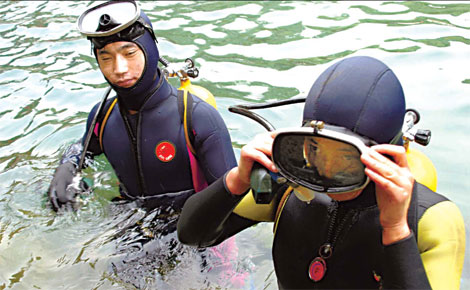Top Biz Photos
Chinese divers splash out on courses
By Yu Tianyu (China Daily)
Updated: 2010-07-26 09:51
 |
Large Medium Small |
|
 |
|
'Did you enjoy a deep dive last night?' has become a popular greeting among young white collar workers in the office this summer. Diving has become one of the fastest growing sporting hobbies in China. [Zhou Qianxian / For China Daily] |
Nation becomes the world's fastest growing market for learning to dive
BEIJING - When 25-year-old He Fan watched Disney's Finding Nemo she was captivated by the wondrous sights beneath the waves.
The English language teacher from Urumqi, the capital of Xinjiang Uygur autonomous region - the world's most landlocked city - had only ever experienced 30 minutes of snorkeling before, albeit off the tropical paradise Indonesian island of Bali.
However, fuelled by those two experiences and a curiosity about marine life that she has nurtured since childhood, He splashed out on professional diving instruction and gained a globally recognized certificate of competence, despite knowing she was entering deep financial waters.
"Different oceans in different seasons offer completely different 'wow' experiences," she said. "I have tried more than 20 diving destinations worldwide in the past five years. Diving at this level is really costly. I spent about 45,000 yuan on equipment. The total cost of one-hour scuba diving is about $200 on average.
"The Little Mermaid is not only a charming film, it also charms our purses.".
According to Henrik Nimb, a senior official with the Professional Association of Diving Instructors (PADI), the world's largest diving training organization, about 5,000 Chinese people attained PADI certification between 2001 and 2008.
There are about 30 diving centers and resorts across China certified by PADI, two of which are in Beijing: Extreme Experience Diving Club and Beijing Dragon Diving. Shanghai has five centers while tropical Hainan has 10 high-end PADI centers and resorts.
Nimb said that China has become the fastest-growing market for PADI in the world and he believes that it will become the world's largest diving market within 10 years.
Professional divers
Manoel Wang, a manager at Masey International Exhibition Co Ltd, said: "Currently, only 0.1 percent of tourists from the mainland are experienced divers and they always travel to their diving destinations on their own accord and not through travel agencies.
"Professional diving is a money-burning activity: The full set of equipment would cost you 30,000 yuan at least. If you rent at the diving resort, the price ranges from $100 to $150 per session on average."
The cylinder containing enough air for 45-minutes costs $100 and the instructor tends to charge $100 for a two-hour service, Wang added.
It's not only the inexperienced who need an instructor, Wang said. Experienced people diving in an unfamiliar place should also be accompanied. The rule is all divers should at least be accompanied by a "buddy" - someone to help them out if a situation gets tricky.
"Diving in the Chinese mainland is still in its infancy because it has not been part of the culture and the market still needs to be explored," said Wang.
Because of their geography, people in Taiwan, from where Wang comes, and Hong Kong learn about the ocean at a very early age and they regard them like a gym, treating sea-related sports as daily exercise as well as a part of their social lives, the businessman said.
Some industry experts say the expense has deterred many who might be interested.
Lu Bing, a scuba diving trainer in Dalian, Liaoning province, said that a PADI course would cost more than 3,500 yuan on the mainland but was about $50 to $100 in other countries.
Wang said: "You can learn and take the test abroad if you are confident speaking a foreign language."
PADI had awarded about 18.5 million certificates worldwide by 2009. A total of 87,401 took the test in 2009. About 67 percent of certifications are awarded to male divers. The average age of PADI-certified divers is 29.
"But in China, most of my tourists are in their 30s. Many are wealthy," Wang said. "Chinese young people tend to regard diving as nothing more than watching fish. They prefer to try something more exciting."
The post-80s generation has become a major force driving consumption in China's urban areas, according to a survey by market consulting firm CTR. Women and more wealthy people, who usually have higher education backgrounds, job status and income, are the other two highest spenders, it said. These are the groups Chinese diving centers want to attract.
Industry experts say that Chinese diving organizers and diving center operators need to further improve the quality of their services with better equipment for rent, as well as introduce exciting programs to lure youngsters.



